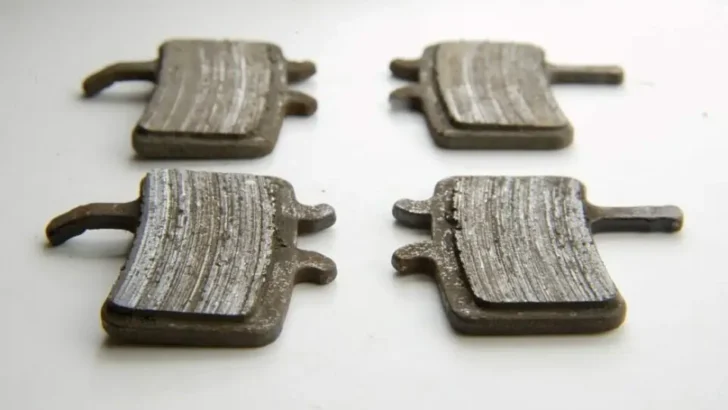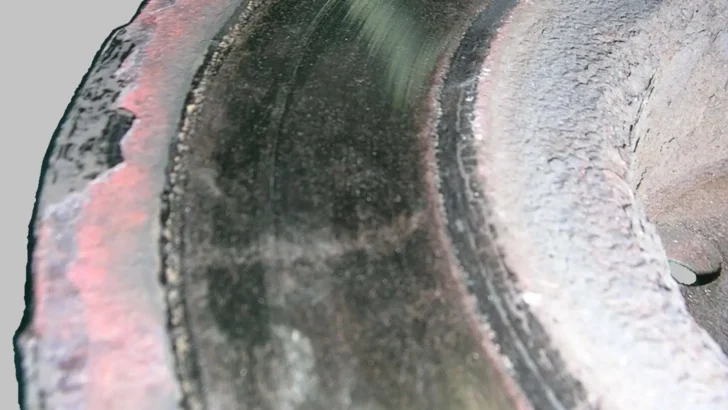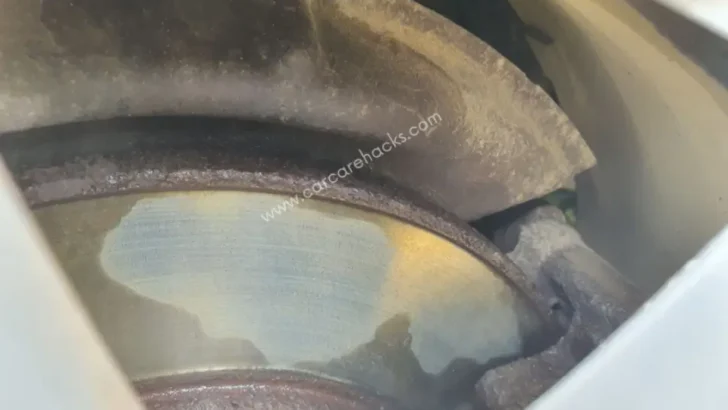Brakes are a critical component of any vehicle, ensuring safety by enabling it to stop efficiently.
However, when your brakes start making unusual noises – grinding, thumping, or squeaking – it’s a clear sign that something may be amiss.
These sounds often indicate potential issues with the brake system, ranging from worn-out components, and lack of lubrication, to more serious mechanical problems.
Understanding why these noises occur is crucial in maintaining your vehicle’s safety and performance.
In this article, we’ll delve into the common reasons behind these unsettling brake noises and what they could mean for your vehicle.
- Why Brakes Make Grinding Noise
- Why Brakes Make Thumping Noise
- Why Brakes Make Squeaking Noise
- How To Stop Squeaky Brakes?
- Why Are Brakes Grinding But Pads Not Worn?
- Why Do Brakes Only Grind Sometimes?
- Why Are My Brakes Grinding When Driving?
- Why Are My Brakes Grinding After Replacing Pads & Rotors?
- What Happens When You Ignore Grinding Noise When Braking?
- FAQs
- Q: Why are my brakes making noise?
- Q: What causes brake noise?
- Q: Why do my brakes squeal?
- Q: How do I know if my brake pads need to be replaced?
- Q: Can I stop my brakes from squeaking?
- Q: What should I do if my brakes are making a grinding sound?
- Q: Are squeaking brakes dangerous?
- Q: Can low-quality brake pads cause brake noise?
- Q: What can I do to prevent my brakes from making noise?
- Q: When should I have my brakes serviced?
- In Conclusion
Key Takeaway
- Brakes make a grinding noise when the brake pads are worn out, causing the metal caliper and the metal disc to rub against each other during braking.
- Brakes make a thumping noise primarily due to rotor damage or rust, which can occur especially if the car sits outside frequently.
- Brakes make a squeaking noise primarily due to worn or thin brake pads which cause the calipers to squeeze against the brake rotors, resulting in vibration and friction.
- To stop squeaky brakes, you can lubricate the brake pads, clean the calipers and clips, or replace the brake pads if they’re worn out or contaminated.
Why Brakes Make Grinding Noise

Brakes make a grinding noise due to various reasons like worn-out brake pads, foreign objects in the brake system, lack of lubrication, or damaged rotors, all of which are serious issues needing immediate professional inspection and repair to ensure vehicle safety.
rakes can make a grinding noise for several reasons, each indicating a potential issue with your vehicle’s braking system.
One common cause is worn-out brake pads. Over time, brake pads wear down and may eventually become so thin that the metal backing plate of the pad is exposed.
When you apply the brakes, this metal plate can grind against the brake disc or rotor, causing a harsh grinding noise. This situation is not only noisy but also potentially dangerous as it can significantly impair your vehicle’s stopping ability.
Another reason could be a foreign object, such as a small stone or debris, getting caught between the brake pad and the rotor. This can create a grinding noise when the brakes are applied.
Additionally, a lack of proper lubrication can also lead to a grinding noise. Brake components require sufficient lubrication to function smoothly. If these parts aren’t adequately lubricated, they can produce a grinding sound due to increased friction.
Lastly, a damaged or warped rotor can also cause a grinding noise. Rotors are designed to have a flat and smooth surface for the brake pads to press against. If the rotor is damaged, warped, or excessively worn, it can lead to irregular contact with the brake pads, resulting in a grinding sound.
Why Brakes Make Thumping Noise

Brakes can make a thumping noise due to issues such as warped rotors, worn-out brake pads, or problems with the brake drums. These conditions create irregular contact between brake components, leading to a thumping sound.
When rotors are warped or unevenly worn, they can cause a pulsating sensation and a thumping noise when the brakes are applied. This is because the brake pads can’t make consistent contact with the rotor surface, creating a rhythmic thump each time the high spot on the rotor comes into contact with the brake pad.
Worn-out brake pads can also contribute to a thumping noise. As the brake pads wear down, they may start to make irregular contact with the rotors, causing a thumping sound. In some cases, the brake pad’s wear indicator, a small metal tab that contacts the rotor when the pad material is dangerously thin, can cause a thumping noise.
Problems with the brake drums in vehicles equipped with drum brakes can also lead to a thumping sound. For instance, if the brake shoes (the friction material in drum brakes) are worn unevenly or the drum itself is out of round, it can cause a thumping noise when the brakes are applied says JDPower.
Why Brakes Make Squeaking Noise

Brakes can make a squeaking noise due to various factors, including worn-out brake pads, glazed rotors or pads, or the presence of brake dust. These conditions can lead to high-frequency vibrations when the brakes are applied, resulting in a squeaking sound.
One of the most common causes of squeaky brakes is worn-out brake pads. Most brake pads have built-in wear indicators that scrape against the brake rotor when the pads are worn down to a certain point.
This scraping produces a high-pitched squeaking noise, alerting the driver that it’s time to replace the brake pads.
Brake pads and rotors can also become glazed due to excessive heat. Glazing occurs when the brake pads get heated to the point where the pad material hardens and becomes smooth, similar to glass. Similarly, rotors can also become glazed if they’re subjected to intense heat.
The smooth, hardened surfaces of glazed pads and rotors can generate a squeaking noise when they come into contact.
Another reason for squeaky brakes could be the accumulation of brake dust. Over time, as the brake pads wear down, they produce dust that can collect on the brake components. This dust can cause a squeaking noise when the brakes are applied.
In some cases, the brake caliper slides may need lubrication. If these slides become dry or rusty, they can create a squeaking noise during braking.
How To Stop Squeaky Brakes?
Check the Brake Pads
Firstly, inspect your brake pads. If they’re worn out, they might be the cause of the squeaking noise. Replacing them could solve the issue.
Clean the Brakes
Dirt, dust, and grime can accumulate on your brakes, causing them to squeak. A thorough cleaning using a brake cleaner product can remove these particles and potentially stop the noise.
Use Brake Lubricant
Lubricating the moving parts of your brakes can reduce friction, which might be causing the squeaking sound. Use a high-temperature brake lubricant on the back of the brake pads and other moving parts.
Check for Rust
If your car has been sitting idle for a while, rust could have formed on the brake rotors. Driving the car and lightly applying the brakes several times can help scrape off the rust.
Install Brake Pads with Shims
Brake pads with shims are designed to reduce noise. If your current brake pads don’t have these, consider switching to ones that do.
Get Professional Help
If you’ve tried everything and your brakes continue to squeak, it might be time to seek help from a professional. A skilled mechanic can diagnose and fix the problem accurately.
Why Are Brakes Grinding But Pads Not Worn?
Even if the brake pads are not worn out, brakes can still make a grinding noise due to foreign objects in the brake system, rust buildup, or issues with the brake caliper.
One common cause is the presence of a foreign object. This can be a small stone or debris, trapped between the rotor and the brake pad. This can create a grinding noise each time you apply the brakes.
Rust or corrosion on the brake rotors can also cause a grinding sound. If your vehicle has been sitting idle for an extended period, especially in a damp environment, rust can form on the surface of the rotors. When the brakes are applied, the pads scrape against this rust, causing a grinding noise.
Issues with the brake caliper can also lead to grinding noises. The brake caliper houses the brake pads and, through the use of hydraulic pressure, pushes the pads against the rotor when you step on the brake pedal.
If the caliper is damaged or malfunctioning, it could cause the pad to rub continuously against the rotor, leading to a grinding noise.
Why Do Brakes Only Grind Sometimes?
Brakes might only grind intermittently due to a few reasons, including varying weather conditions, the presence of rust or debris, and mechanical issues.
One reason brakes may only grind sometimes is due to weather conditions. In colder temperatures, for example, your brakes might produce a grinding noise until they reach their normal operating temperature. Once the brakes are warmed up, the grinding sound often disappears.
Another common cause is rust or moisture buildup on the brake rotors. If your car has been parked for a long time, especially in damp conditions, a thin layer of rust can form on the rotors. This can cause a grinding sound when the brakes are initially applied. However, as you continue to use the brakes, the rust gets scraped off, and the noise ceases.
In some cases, small rocks or other debris can get lodged between the brake pad and rotor, causing a grinding noise. But these can often be dislodged after a few uses of the brakes, which would stop the noise.
Lastly, intermittent grinding could indicate a more serious mechanical problem, such as a worn-out wheel bearing or an issue with the brake caliper. These might not cause a constant grinding noise but should be checked out immediately.
Why Are My Brakes Grinding When Driving?
Brakes grinding while driving can be caused by a variety of issues, including worn brake pads, foreign objects lodged in the brake system, or rust on the brake rotors.
One of the most common causes of grinding brakes is worn-out brake pads. Over time, the friction material on the brake pads wears down.
When the pads are severely worn, the metal backing plate of the pad makes contact with the brake rotor, leading to a grinding noise. This requires immediate attention as it could damage the rotors and significantly reduce braking efficiency.
Another reason for grinding noises could be foreign objects, such as rocks or debris, stuck in the brake system. These objects can get trapped between the brake pad and rotor and create a grinding sound when the brakes are applied. Typically, these objects get dislodged over time, but if the noise persists, it’s best to have the brakes inspected.
Why Are My Brakes Grinding After Replacing Pads & Rotors?
The grinding noise from your brakes even after replacing pads and rotors could be due to several reasons:
Improper Installation: If the brake pads or rotors aren’t installed correctly, it may result in a grinding noise. This can happen if the components are not securely fitted or if the brake pads are installed the wrong way.
Faulty Parts: There could be a chance that the new brake parts are defective. If the surface of the rotor isn’t smooth or the brake pads have some flaws, they might produce a grinding sound when you apply the brakes.
Lack of Lubrication: The brake components need sufficient lubrication to work smoothly. If the moving parts didn’t receive enough lubricant during installation, it could lead to the parts grinding against each other.
Presence of Foreign Objects: Sometimes, small debris can get trapped between the brake pad and rotor during the installation process, causing a grinding noise.
Issues with Brake Caliper: If the brake caliper isn’t retracting as it should, it might cause the brake pads to stay in contact with the rotors, which can result in a grinding sound.
If you’re hearing a grinding noise after installing new brake components, get the problem checked out right away. Continued grinding can cause further damage and potentially unsafe driving conditions.
What Happens When You Ignore Grinding Noise When Braking?
Ignoring a grinding noise when braking can lead to several serious issues:
Increased Damage: The grinding noise is usually a sign that your brake components are rubbing together in an abnormal way. If this continues, it can cause increased wear and tear, damaging the brake pads, rotors, or other parts of the braking system.
Decreased Brake Efficiency: As the components become more worn down, your vehicle’s braking efficiency can significantly decrease. This means you might find your car taking longer to stop, which can be dangerous, especially in emergency situations.
Higher Repair Costs: If the grinding is due to a minor issue, addressing it early could save you money. But if left unattended, the problem could escalate, leading to more extensive damage and consequently, higher repair costs.
Potential for Accidents: The most serious risk of ignoring a grinding noise when braking is the potential for accidents. If your brakes fail due to severe damage, it could result in a serious accident.
In conclusion, if you hear a grinding noise when braking, get your vehicle inspected as soon as possible. It’s not worth risking your safety or potentially facing high repair costs down the line.
FAQs
Q: Why are my brakes making noise?
A: There can be several reasons why your brakes are making noise. It could be due to squealing, squeaking, or grinding sounds coming from your brakes.
Q: What causes brake noise?
A: Brake noise can be caused by worn brake pads, glazed brake rotors, rust, or a stuck brake caliper.
Q: Why do my brakes squeal?
A: Brake squeal is a common issue and it is caused by the vibration between the brake pad and the rotor disc. It could also be due to worn brake pad material or the presence of a wear indicator.
Q: How do I know if my brake pads need to be replaced?
A: If you hear a high-pitched squealing noise when applying the brakes, it might indicate that your brake pads are worn and need to be replaced. It is advisable to have a mechanic inspect your brakes to determine the extent of wear and make necessary repairs.
Q: Can I stop my brakes from squeaking?
A: In some cases, you might be able to stop your brakes from squeaking by cleaning the brake pads and rotors, or applying an anti-squeal lubricant. However, it is important to address the underlying issue causing the noise to prevent further damage.
Q: What should I do if my brakes are making a grinding sound?
A: If you hear a grinding sound when applying the brakes, it is likely that your brake pads and rotors are worn beyond their acceptable limit. In such cases, it is essential to replace your brake pads and have the rotors resurfaced or replaced by a qualified mechanic.
Q: Are squeaking brakes dangerous?
A: While squeaking brakes may not necessarily indicate a safety issue, they should not be ignored. Squeaking brakes can be a sign of worn or faulty brake components, which can compromise the effectiveness of your car’s brakes. It is recommended to have them inspected and repaired by a professional.
Q: Can low-quality brake pads cause brake noise?
A: Yes, low-quality brake pads can contribute to brake noise. The materials used in cheaper brake pads may not have the same level of effectiveness and durability as higher-quality options. Investing in higher-quality brake pads can reduce the likelihood of experiencing brake noise.
Q: What can I do to prevent my brakes from making noise?
A: To prevent your brakes from making noise, regular maintenance and inspections are crucial. This includes properly lubricating the brake system, ensuring the brake calipers are functioning correctly, and replacing worn brake pads and rotors on time.
Q: When should I have my brakes serviced?
A: It is recommended to have your brakes serviced if you notice any unusual noises, decreased braking performance, or if it has been a while since your last brake inspection. Regular brake service can help identify and address issues before they escalate and affect the safety of your vehicle.
In Conclusion
Brakes can make grinding, thumping, and squeaking noises due to a variety of reasons.
It could be due to worn-out brake pads, improper installation of components, lack of lubrication, presence of foreign objects, or even issues with the brake caliper.
These sounds are your car’s way of alerting you that something might be off with your braking system.
Ignoring these noises can lead to further damage, decreased brake efficiency, and higher repair costs. Most importantly, it can pose a serious risk to your safety on the road.
